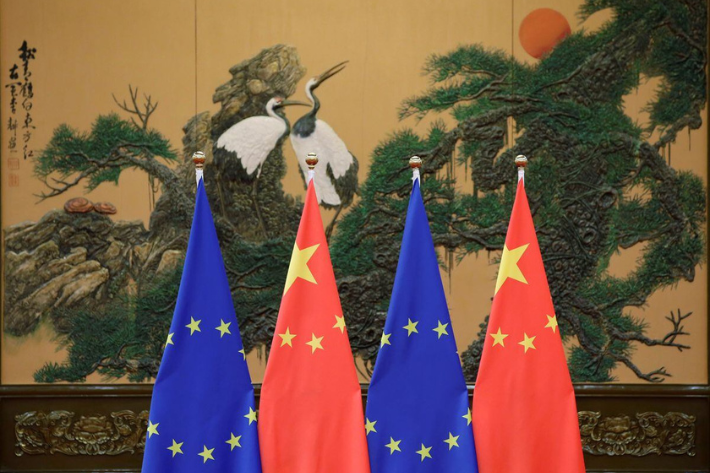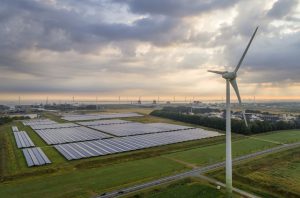Souring trade ties between Brussels and Beijing are weighing on European firms operating in China and forcing them to focus more on managing risks instead of making efficient business decisions, a commerce lobby group has warned.
The European Union’s recent ‘de-risking’ moves have fuelled concerns about the politicisation of the business environment in China to record highs, a new survey by the European Union Chamber of Commerce in China found.
That fear is leading European firms in the country to focus ‘disproportionately’ on managing risk and building resilience, instead of increasing market share, the lobby group said.
Also on AF: Apple CEO Cook in China, Meets Suppliers Amid Falling iPhone Sales
About three-quarters of the chamber’s 1,700 members have reviewed their supply chains in the past year, with 21% moving more production into China and 12% moving more out, the chamber said.
The skewed priorities were hurting the efficiency and innovation of European businesses in China and increasing costs for consumers, it added.
“China has a rational self-interest in ensuring that there is a workable commercial relationship with Europe going forward. And that, frankly, is put at risk right now,” Jens Eskelund, the group’s president, said.
“I think there is a risk that Europe feels compelled to react in more protective ways.”
Last year, the EU Commission announced an investigation into Chinese electric vehicles (EVs) over concerns that they were being funded by state subsidies. Those subsidies were giving Chinese carmakers a steep price edge over their European competitors and allowing them to ‘flood’ the market, Commission President Ursula von der Leyen said.
China retaliation fears
Earlier this month, the commission said it had sufficient proof of Beijing’s subsidies and introduced legislation mandating customs registration of all Chinese EVs entering the region. The move is widely seen as the EU’s first step towards slapping retroactive tariffs on Chinese EV-makers.
Separately, the EU has been looking to address reliance on a wide-range of other imports from China, including steel, wind turbines and solar panels.
In a retaliatory move, Beijing opened an anti-dumping investigation on brandy imported from the EU in January this year.
“It’s hard to see how 300 euro ($330) bottles of XO can be accused of dumping,” Eskelund was quoted as saying by the Associated Press.
He also noted how Beijing, in its push for reliance, was pushing businesses in critical industries to replace Western technologies and softwares with homegrown alternatives. The move has translated into a revenue windfall for Western sanctions-hit firms like Huawei.
View this post on Instagram
Eskelund urged the EU to prioritise dialogue with Chinese authorities, otherwise there could be more “tit-for-tat” trade measures going forward.
“China is applying exactly the same logic across vast sectors of the economy that Europe is now just beginning to do on a rather limited scale,” he said.
A ‘slow-motion train accident’
Meanwhile, the lobby also warned that China’s ability to continue manufacturing strategic products at cheap rates is only set to worsen ties between Brussels and Beijing.
“What we see right now is the unfolding of a slow-motion train accident,” Eskelund was quoted as saying by CNBC.
“Europe cannot just accept that strategically viable industries constituting the European industrial base are being priced out of the market,” Eskelund said.
“That’s when trade becomes a security question and I think that is perhaps not fully appreciated in China just yet.”
Cheap Chinese solar panels, for instance, have flooded European markets and are killing the region’s limited solar panel-makers. And yet, European leaders have accepted that cutting off Chinese solar panels isn’t an option for the region as it chases ambitious energy transition targets.
Meanwhile, China is on track to manufacture enough solar power capacity to meet annual global demand through to 2032, all while managing to produce and sell these technologies at half the cost of European rivals.
The EU has also found itself dependent on China for certain products including critical minerals, but is now taking steps to closely scrutinise those supply chains. This week, EU countries approved final targets for the domestic supply of critical minerals such as lithium and nickel, under a new so-called Critical Raw Materials Act.
The law says the bloc should extract 10%, recycle 25% and process 40% of its annual needs for some “strategic raw materials” by 2030. It is aimed at reducing Europe’s reliance on third countries, principally China.
View this post on Instagram
- Reuters, with additional inputs from Vishakha Saxena
Also read:
EU Probe Into AliExpress Over Online Compliance, Illegal Products
EU Investigators in China to Probe EV-Makers BYD, Geely, SAIC
China, EU in Auto, Raw Materials Cooperation Talks
China’s Free Trade Olive Branch to EU Amid Subsidy Probes
EU Vows to Stem ‘Unfair Competition’ With New China Subsidy Probe
Raimondo Says Chinese EVs Are a National Security Risk For US, EU
US, EU Can’t Meet Climate Goals Without China’s Cheap Green Tech
China’s Surging Exports Tipped to Spur Global Backlash – NYT
























